
The Commodore 64, also known as the C64, is an 8-bit home computer introduced in January 1982 by Commodore International. It has been listed in the Guinness World Records as the highest-selling single computer model of all time, with independent estimates placing the number sold between 12.5 and 17 million units. Volume production started in early 1982, marketing in August for US$595. Preceded by the VIC-20 and Commodore PET, the C64 took its name from its 64 kilobytes(65,536 bytes) of RAM. With support for multicolor sprites and a custom chip for waveform generation, the C64 could create superior visuals and audio compared to systems without such custom hardware.

Commodore International Corporation was a Bahamian home computer and electronics manufacturer with executive offices in the United States founded by Jack Tramiel and Irving Gould. Commodore International (CI), along with its subsidiary Commodore Business Machines (CBM), was a significant participant in the development of the home computer industry in the 1970s to early 1990s. In 1982, the company developed and marketed the world's second-best selling computer, the Commodore 64, and released its Amiga computer line in July 1985. Commodore was one of the world's largest personal computer manufacturers, with sales peaking in the last quarter of 1983 at $49 million.
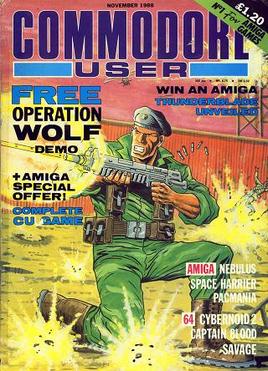
Commodore User, later renamed to CU Amiga, is a series of American and British magazines published by Commodore International.
David Whittaker is an English video game composer. He is known for writing video game music in most of the 1980s and early 1990s for different formats.

Road Runner is a racing video game based on the Wile E. Coyote and Road Runner shorts. It was released in arcades by Atari Games in 1985.

Paperboy is an arcade action game developed and published by Atari Games, and released in 1985. The player takes the role of a paperboy who delivers a fictional newspaper called The Daily Sun along a street on his bicycle. The arcade version of the game featured bike handlebars as the controller.

Krome Studios Melbourne, originally Beam Software, was an Australian video game development studio founded in 1980 by Alfred Milgrom and Naomi Besen and based in Melbourne, Australia. Initially formed to produce books and software to be published by Melbourne House, a company they had established in London in 1977, the studio operated independently from 1987 until 1999, when it was acquired by Infogrames, who changed the name to Infogrames Melbourne House Pty Ltd.. In 2006 the studio was sold to Krome Studios.
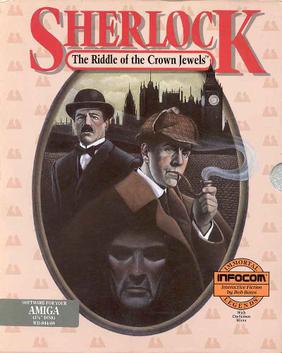
Sherlock: The Riddle of the Crown Jewels is an interactive fiction computer game designed by Bob Bates and published by Infocom in 1987. Like most titles Infocom produced, the use of ZIL made it possible to release the game simultaneously for many popular computer platforms, including the Apple II, DOS and Commodore 64. Sherlock is based on the legendary fictional detective Sherlock Holmes, created by Sir Arthur Conan Doyle. It is Infocom's thirty-first game and is the first of two Infocom games developed by Challenge, Inc. using Infocom's development tools.

The Commodore 64 Games System is the cartridge-based home video game console version of the popular Commodore 64 home computer. It was released in December 1990 by Commodore into a booming console market dominated by Nintendo and Sega. It was only released in Europe and was a considerable commercial failure. The C64GS came bundled with a cartridge containing four games: Fiendish Freddy's Big Top O'Fun, International Soccer, Flimbo's Quest, and Klax.
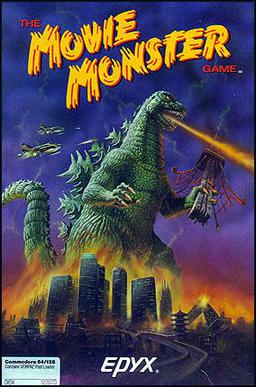
The Movie Monster Game is a computer game released by Epyx for the Apple II and Commodore 64 in 1986. The game offers a variety of scenarios, playable monsters, and cities to demolish. The monsters are based on popular movie monsters such as The Blob, Mothra, the Stay Puft Marshmallow Man, and the Transformers, and Epyx was able to officially license Godzilla.
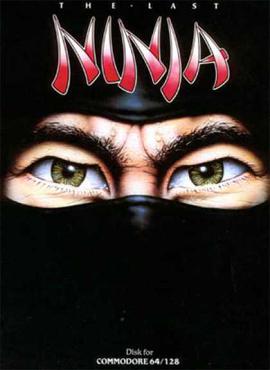
The Last Ninja is an action-adventure game originally developed and published by System 3 in 1987 for the Commodore 64. It was converted to the Apple IIGS, MS-DOS, BBC Micro and Acorn Electron in 1988, the Apple II series in 1989, the Amiga and Atari ST in 1990, and the Acorn Archimedes in 1991.
Kick Start is a British motorcycle trials game show that aired on BBC1 from 6 August 1979 to 17 August 1992. It was originally hosted by Dave Lee Travis from 1979 to 1980 and then it was hosted by Peter Purves from 1981 to 1992.
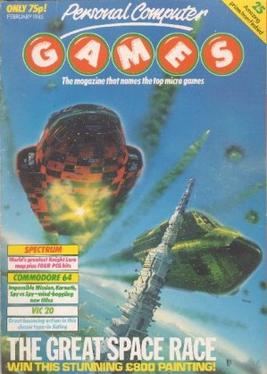
Personal Computer Games was a multi-format UK computer games magazine of the early/mid-1980s published by VNU.

Superman: The Game is a 1985 video game designed by Fernando Herrera and published in the US by First Star Software for the Commodore 64. For European release, Superman was ported the Acorn Electron, Amstrad CPC, Atari 8-bit computers, BBC Micro, and ZX Spectrum.

Cloud Kingdoms is a puzzle game published by Millennium Interactive for the Amiga, Atari ST, Commodore 64, and MS-DOS in 1990. The player controls Terry, a green bouncing sphere, on a quest to recover his magic crystals that have been stolen by Baron von Bonsai. To do so, he must travel through the eponymous Cloud Kingdoms, avoiding enemies and hazards while collecting all of the crystals within the game's time limit. The game was developed by Dene Carter at Logotron, with sounds and music composed by David Whittaker.

The Amiga CD32 (stylized as Amiga CD32, codenamed "Spellbound") is a 32-bit home video game console developed by Commodore and released in Europe, Australia, Canada, and Brazil. It was first announced at the Science Museum in London on July 16, 1993, and was released in September of the same year.
Tiertex Design Studios Limited was a British software development company and former video game developer based in Macclesfield, England; it was founded in 1986, focusing on porting games to home computers and handheld platforms.

Casual Arts, formerly known as Flair Software, is a British video game developer and publisher of the 1990s that developed and published games for the Amiga, Amiga CD32, Atari ST, Commodore 64, DOS, PlayStation, Sega Saturn and SNES. It was set up by Colin Courtney in 1990 after his previous company, Tynesoft, went bankrupt. It retained Tynesoft's MicroValue brand and published Elvira: The Arcade Game which had originally been scheduled for publication by Tynesoft.

The Thompson Twins Adventure is a 1984 graphic adventure game that was distributed by Computer and Video Games magazine as a promotional 7" flexi disc "freebie" along with its October 1984 issue. The game is based on the Thompson Twins' single "Doctor! Doctor!", and features the Thompson Twins band members as the protagonists. The unusual storage format of the game showcases an experimental technique pioneered by the London-based Flexi Records label, and places the game alongside a small handful of other games distributed on grooved disks. This format never became established and The Thompson Twins Adventure is today valued more for its nostalgic and artifactual value than for its ludological aspects which have been uniformly panned by critics.
















